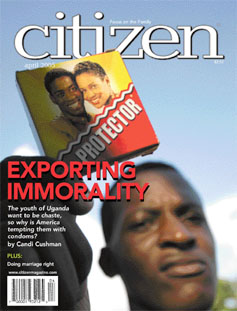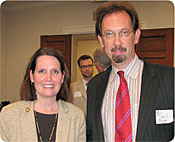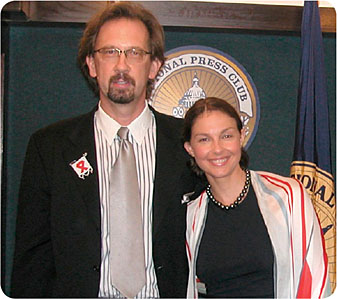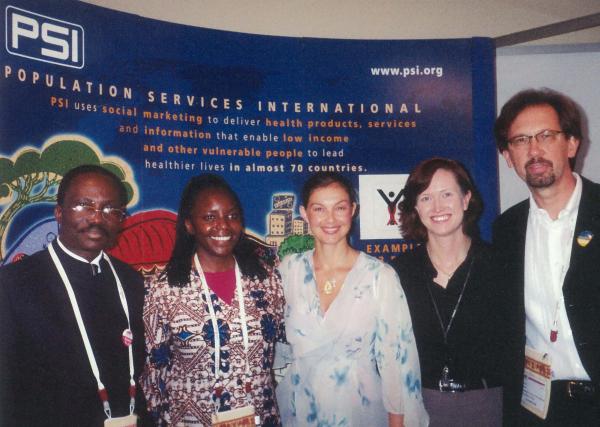
 |
|
 The Politicization of AIDS THE PROBLEM: Starting in 2003 and intensifying through 2005, PSI came under fire from the political and religious right over our HIV prevention work with vulnerable groups like commercial sex workers, particularly in Central America. Sen. Tom Coburn and Rep. Chris Smith both wrote letters sharply attacking our work and the U.S. government funding of it. Focus on the Family called for an investigation of PSI and featured us on their cover twice in unflattering ways, such as the one above highlighting PSI's condom brand in Uganda. The choice of Central America as a vehicle for attacking PSI was strategic: At the time the letters were written, USAID was in the middle of a bidding process for a five-year HIV prevention project in the region following on from the five-year project that PSI had been managing. The letters resulted in USAID interrupting the process - an action described by people in the global health community as unprecedented political meddling. The new tender seemed to be written in such a way to make it difficult for PSI to win. THE SOLUTION: PSI, an organization not prone to advocacy up to that point, launched its first serious advocacy campaign to save its Central American program, which had already shown evidence of preventing HIV. I played a major role by leading the following efforts:
There were many other actions carried out by myself and colleagues at PSI but I list the ones above - in which I played the leading role - to give a sense of the many elements of the advocacy campaign we undertook to save our Central American program. THE RESULTS: Just about the time we decided that the fix was in and that we would not win a grant we deserved to win based on our track record and the evidence, USAID notified us that it was awarding PSI $10 million to carry on our targeted HIV prevention program in Central America for another five years. This experience showed us for the first time that advocacy can contribute, in a very concrete way, to health impact if you get the evidence to the right people and the truth emerges.  Rep. Betty McCollum, Democrat of Minnesota, is a global health leader with whom I worked to get out the truth about evidence-based HIV prevention. |
|
 Ashley Judd and I at the National Press Club in 2005 after she delivered this speech I wrote with her: http://www.olsonglobalcom.com/files/judd-speech.pdf I wrote this story of the battle over our Central American program for the PSI website in 2005. This was the most public acknowledgment of the behind-the-scenes struggle that was going on at that time. Targeted Program at Center of Debate WASHINGTON, DC, August 28, 2005 - PSI's innovative and effective program targeting high-risk groups against HIV infection in Central America has received favorable coverage in the New York Times and Baltimore Sun. On Aug. 26, the Times published a commentary by Assistant Editorial Page Editor Helene Cooper which defended two activities employed by the Pan American Social Marketing Organization (PASMO), PSI's Central American affiliate, to reach commercial sex workers, their clients and other high-risk groups. The article also criticized the actions of Sen. Tom Coburn, R-Oklahoma, who belittled the activities in a letter to President Bush on May 19. On Aug. 28, a front page Baltimore Sun story written by Health Reporter David Kohn entitled "Health groups, religious right clash over anti-HIV efforts for prostitutes" focused on PSI's Central American program and whether programs targeting prostitutes can protect them from infection without promoting their vocation. Coburn grossly misrepresented these educational activities which reduce risk and contain the epidemic. One of the activities called "Lotereria" is a game similar to bingo that educates prostitutes, many of them illiterate, in how they can protect themselves against HIV infection. The other - Noches Vive - has peer educators going into bars, brothels and other places where prostitutes and their clients congregate to hand out condoms and teach them how to use them correctly. The New York Times article described in detail how the activities educate these groups. "It's a simple activity for largely illiterate people," PSI Regional Rep Michael Holscher is quoted as saying. "We just can't stand up in a bar and say 'AIDS will kill you.' With an interactive activity, we can hold their attentions, sometimes for as long as an hour." But "apparently one hour of AIDS prevention in a Guatemala bar is one hour too long for the senator from Oklahoma's delicate sensibilities," Cooper wrote, because shortly after Mr. Coburn's letter went out, the U.S. Agency for International Development cancelled the process for selecting a follow-on project to continue these activities, with no explanation. The Baltimore Sun article reported that Central America's HIV rate is about 1 percent, far less than in many other parts of the world, but is as high as 20 percent among prostitutes. Writes Sun reporter Kohn: "Last year, PSI's program made contact with 422,000 people in high-risk groups and sold 14 million condoms in the region. In parts of Guatemala, where PSI has significantly expanded its work, HIV infections among prostitutes have fallen by a third. Hans Moerkerk, an official with the United Nations' AIDS office, said the program was one of the best in the region. 'It would be disastrous if it stopped,' he said." Both articles pointed out that some Republican senators have disagreed with Sen. Coburn, notably Sen. Larry Craig of Idaho, who wrote a letter in July to the USAID administrator asking for USAID to reconsider its decision. "Controlling infectious diseases abroad is domestic policy as much as foreign," Sen. Craig is quoted in the Times. "Ignoring the problem by hamstringing proven programs is a disservice to U.S. citizens who are impacted by the wave of immigrants from these countries." The Times concluded: "Mr. Coburn, a doctor, has apparently forgotten everything they taught him in medical school. Any doctor with sense knows that while abstinence may be a surefire way to prevent AIDS, teaching condom usage to prostitutes isn't far behind." - David J. Olson  Ashley (center) and I with PSI colleagues at the 2004 AIDS Conference in Bangkok, Thailand. |